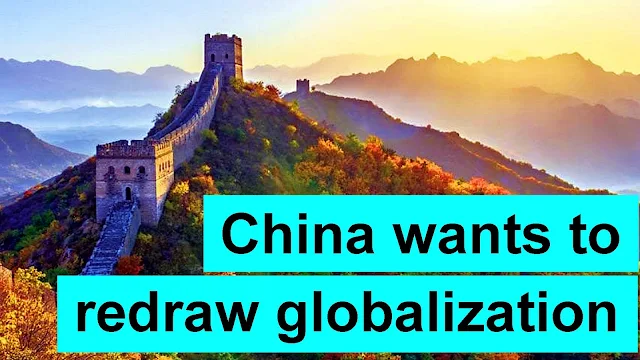Great winner of globalization in the last century and now artisan of "new silk roads", China is self-proclaimed herald of free trade against the American insulationist Donald Trump, and intends to redraw in its own way Trade of the twenty-first century.
"We will not close the door to the world, but open it even more widely," Chinese President Xi Jinping said in November, just after the election of the American billionaire. It is the new antenna of Beijing: at the Economic Forum of Davos, Mr. Xi must defend Tuesday his vision of a "more inclusive globalization", encouraging "to put globalization in its right perspective".
A spade against Donald Trump, which promises to abandon the Transpacific Free Trade Agreement (TPP), to erect customs barriers with its neighbors and China and which chastises the World Trade Organization (WTO).
Facing him, the European Union and China "become the main international players defending the opening of trade", commented in December the former head of the WTO, Pascal Lamy. "But the words should be followed by reforms of opening," he insisted.
China, the world's biggest market power, is actually skeptical. Beijing is accused by the EU and the US of dumping, protectionist measures penalizing imported products and restricting access to foreign companies.
According to the Chinese authorities, 119 procedures were launched in 2016 by 27 countries against the commercial practices of the communist regime: a 37% increase over one year.
Silk roads opportunities for China
Admittedly, the second world economy is setting up "new silk roads" surrounding the Eurasian continent and promises investments in infrastructure in Central Asia to boost regional trade. China also wants to revive a free trade agreement (RCEP) linking it to Southeast Asia and the regional powers.
Nevertheless, in the opinion of experts, China defends its interests first, giving only reciprocity to the dropper. The "silk roads" provide opportunities for its surplus production (cement, steel) and reinforce its influence, said AFP Andrew Polk, an analyst at Medley Advisors.
"It is also a vision for 100 years, emblematic of Xi's determination to place China at the epicenter of the world" after the "humiliations" of past centuries, he judges.
But in the immediate future, "there is a big gap between the stated ambitions and the real financing", observes David Kelly, from China Policy. "Beijing pursues diplomatic goals with checks, more than a coherent trade policy." China also does not hesitate to use its trade as a retaliatory tool: imports of Norwegian salmon collapsed after the Nobel Peace Prize to dissident Liu Xiaobo.
In addition, a member of the WTO since 2001, "China is very strong to use multilateral instruments to its advantage", by "insisting on the letter", even if it means diverting "the spirit" of international institutions, notes Andrew Polk.
China remains a model of directed economy
Fueled by a massive trade surplus, "China's economy is structurally incompatible" with the role of "world trade leader", warned in a report Michael Pettis, a professor at Peking University.
The Asian giant remains "a model of directed economy": omnipresent public subsidies, giant state groups, control of capital ... against the canons of classical liberal thought. Impact: Beijing could "sweeten" the content of trade pacts.
Thus, the TPP wanted to be demanding on labor law, environmental standards or fair access to public tenders: "not the tea cup of China," says Polk. Conversely, the RCEP is "a very limited, old-fashioned trade agreement".
Pragmatic, China wants to boost its trade after their plunge of 2016 (-6.9% on January-November). The share of trade in its GDP fell from 66% in 2006 to 40.7% in 2015, according to the World Bank, but remains a crucial growth engine.
However, exporters suffer from the rising cost of the Chinese labor force, which pushes many manufacturing firms to relocate their production to Southeast Asia and to Ethiopia. Beijing is aiming "upmarket" towards higher value-added exports.
But ultimately, "it is unlikely that an American withdrawal from global governance will result in an orderly trading system where the epicenter will swing from Washington to Beijing," warns Mr. Pettis.
"We would go back to the situation before Bretton Woods (1945), with incessant commercial conflicts and political quarrels."
